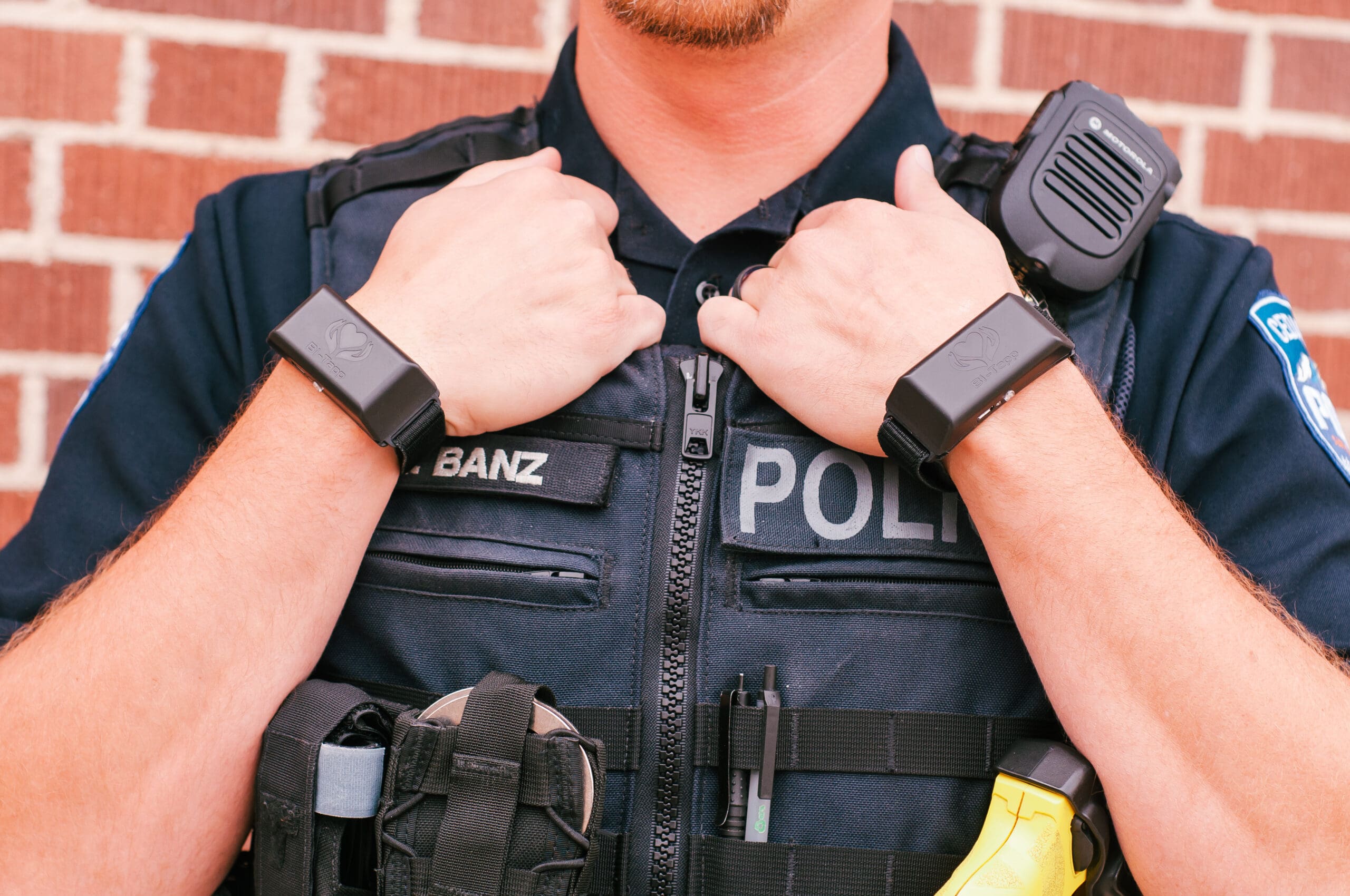First Responders get regular exposure to stressful and traumatic events that can impact every area of their life, Including difficulty getting quality sleep and strained personal relationships. Having access to anxiety relief technology both on “and” off duty is the missing piece in improving the overall health of a First Responder.
In recent years, there has been an increased focus to provide mental health treatment for this population. Debriefings, Peer Support programs and mental health therapy are often available for First Responders to access. There are many reasons why there is a reluctance to participating in these programs. Many participate at a surface level. As a mental health therapist who has worked directly with this population, I respect the complexity of the issues in reaching out for help. Providing anxiety relief technology to every First Responder is a step in the right direction. There is no stigma in accessing this resource; you simply use it when you need to.
Bi-Tapp is the answer to improving the mental health of First Responders because it is easy to use whenever you need it. Using anxiety relief technology during a stressful call will help you perform your best. Utilizing this same resource after a difficult call helps you recover from the situation’s intensity. Use Bi-Tapp in your personal life too. The tappers will help you get better sleep and will help you manage stressful situations that typically you overreact to or underreact to.
Due to the intensity of the work a First Responder engages in day after day, they are at high risk for burnout.
What is Burnout?
Burnout is defined as a state of physical, emotional, and mental exhaustion that results from long-term involvement in work situations that are emotionally demanding. (1)
Signs of Burnout
There are many signs of burnout, including: (2)
- Feeling chronically exhausted
- Feeling ineffective
- Job dissatisfaction
- Irritable
- Trouble concentrating
- Difficulty getting good sleep
- Turning to unhealthy things to cope, like food, alcohol, drugs, gaming late into the night
- Health issues, including high blood pressure
In visiting with Thom, a 40-year Firefighter/EMS veteran, he shares how he has dealt with the pressure of his job: both before and after using Bi-Tapp, anxiety relief technology.
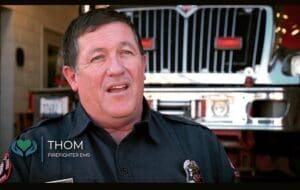
Thom, a 40-year Firefighter/EMS veteran
How have you dealt with the constant pressure of your job?
“We respond to everything, medical and fire. Some calls are really nice and easy and some calls are not. As a First Responder, there is a lot of stress. Sometimes you just try to block stuff out. There were days after bad calls that I felt like I was a failure. A couple of times I thought about getting out of this service, but I enjoy helping people.
When I first started, if you couldn’t handle the situation, you weren’t a real man. Things have come a long way in the last few years. Bi-Tapp has helped me the most. I can turn the tappers on with or without the App. When I am on a call, I place the tappers in my pockets and turn them on when needed. I have noticed a big difference.”
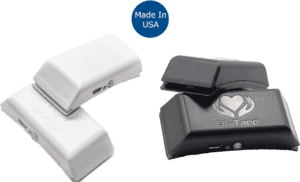
The tappers do the bilateral tapping for you.
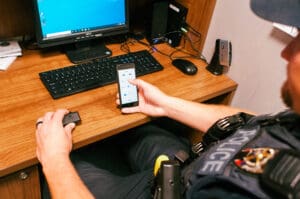
Pair the tappers to the Bi-Tapp App. Select the rate of speed and rate of intensity you prefer.
Barriers to Quality Sleep:
One of the critical components of staying mentally, emotionally, and physically healthy is getting quality sleep. It is repeatedly emphasized to First Responders the importance of getting enough sleep. However, that is easier said than done. There are many barriers to achieving quality sleep as a First Responder. Some of the reasons include:
- Shiftwork
- Long work hours
- Exposure to overwhelming calls with little recovery time
Shiftwork includes working outside the normal daylight hours from 7 am-6 pm. Work in the evening, the night shift, or overtime falls into this category. People who work late nights or early mornings often feel tired during their shift as well as when they are off duty because their sleep cycle has been disrupted. (3)
Long work hours: First Responders often work very long hours.
How long can your shifts be?
“I have been on shifts lasting 36-48 hours. On these long shifts, we are at the station, including sleeping at the station.” Most of us sleep better when we are at home, in our own beds.
Exposure to traumatic events: First Responders are regularly exposed to high stress situations, which are often overwhelming and traumatic. They are typically off to the next call with little to no recovery in between.
What did you do to manage the stress of your job before Bi-Tapp?
“When I had a really bad call, I used to call my wife at 3:00am or 4:00am. There were days I wouldn’t be able to sleep because of the call. I would try to listen to music or do other things to take my mind off of it. Sometimes, I would try to block stuff out to survive.”
Thom’s experience is a common one. As much as you want to go to sleep, you aren’t able to. Your mind continues to go over aspects of the traumatic event, even though you don’t want it to. The inability to sleep often leads to finding unhealthy ways to cope, such as late night eating, alcohol or gaming late into the night to name a few examples.
How is Bi-Tapp helping you get better sleep?
“I sleep a lot better than I have in the past. After a bad call, I now have no problem sleeping. I can turn the tappers on for a few minutes, lay down and I am out. I don’t toss and turn like I used to.”
Strain on personal relationships:
It is normal that after difficult events, there is a tendency to isolate yourself from family or friends. Thom states, “I would go home after a bad call. I didn’t want to be around my family. I didn’t want to talk. My wife said it was stressful. I didn’t realize the effect my actions had on them.”
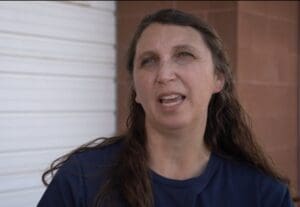
Marie, wife of Thom, a 40-year Firefighter/EMS veteran.
Has your wife noticed a difference in you since you started using Bi-Tapp?
“Marie has told me since using Bi-Tapp, I am calmer and more enjoyable to be around. She has noticed a big difference.”
Marie, Thom’s wife states: “He used to come home and have to destress because of the heavy weight of the day. Now, he comes home ready to engage with our family because he is using the tappers throughout the day. He is managing his stress all day long.
In what situations do you currently use the tappers?
“I use the tapper when I am working EMS. Other situations when I use them would be when I am working at the computer or sitting in a meeting. If I feel like I am getting stressed out, I turn them on. Driving is another time I use the tappers, it makes the drive a lot easier and nicer.
I notice the difference the tappers are making in my life. My family notices it too. I can’t emphasize enough how important this resource is to the Public Safety Field. I am more engaged with people and with life again.”
Who benefits from you having a well-regulated nervous system? You do and so does everyone around you, including your family and friends.
To learn more about this anxiety relief technology, go to bi-tapp.com
To watch Thom’s testimonial video, click here.
References:
- Schaufeli, W. and Greenglass, E. Introduction to Special Issue on Burnout and Health, 2001, Vol 16, pp. 501-510
- Ratini, Melinda. DO, MS. Signs You’re Burned out. WebMD, August 4, 2021
- Rosa, Roger R., Colligan, Michael J. Plain Language about Shiftwork, U.S. Department of Heath and Human Services, July, 1997.

